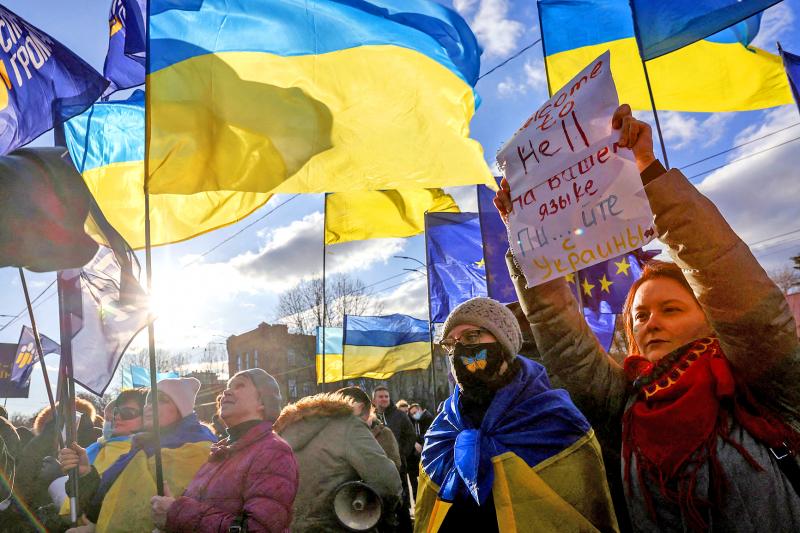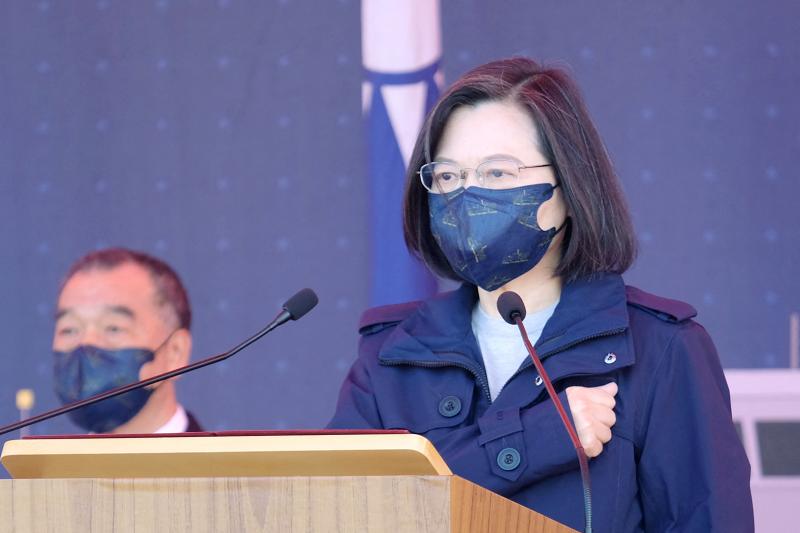Taiwan condemns Russia for undermining Ukraine’s sovereignty and calls for peaceful means to resolve the dispute, President Tsai Ing-wen (蔡英文) said yesterday.
Taipei “condemns Russia’s violation of Ukraine’s sovereignty,” Tsai wrote on Facebook shortly after she was briefed on the latest situation in Ukraine by a National Security Council task force.
The government calls on all sides to use peaceful means to resolve disputes, Tsai said, adding that Taiwan is willing to contribute to de-escalation efforts, although she did not elaborate on what those efforts might be.

Photo: Reuters
Russian President Vladimir Putin on Tuesday officially recognized Ukraine’s breakaway Donetsk and Luhansk regions as sovereign entities.
He also ordered Russian troops into the regions on a “peacekeeping” mission, drawing condemnation from Western governments and international organizations such as the UN and NATO.
The government would continue ensuring the security of Taiwan while keeping an eye on the situation in Ukraine, Tsai said.

Photo: AFP
National security officials and armed forces have been instructed to more closely monitor the situation across the Taiwan Strait and continue to refine their defense readiness, she said.
All government agencies must be on the alert for potential influence operations perpetrated by overseas powers and their local partners that might attempt to use the Ukraine crisis to sway public opinion in Taiwan, Tsai said.
They should step up efforts to clarify false information and prevent its spread, she added.
Tsai also asked the government to prepare for possible short and long-term effects the Ukraine crisis might have on the global and domestic economy, and devise plans to ensure the supply of strategic goods and stabilize commodity prices and the financial market.
On Tuesday, a national security official told the Central News Agency that the nation should be wary of “cognitive warfare” waged by China.
Beijing could use information about Ukraine to plant the idea in Taiwan that the US would not honor its commitment to ensure Taiwan’s security, the official said on condition of anonymity.
Apart from sowing division between Taiwan and the US, such efforts are designed to promote unification with China, the official said.
The situations in Taiwan and Ukraine are not comparable, and the US’ commitment to Taiwan’s security remains firm, the official said, adding that Taiwan occupies a strategic location in East Asia and plays a key role in global supply chains.
A senior Taiwanese official familiar with the government’s security planning told Reuters that the chances of a sudden uptick of military tension are “not high,” but that Taipei has been watching closely for any unusual Chinese activities.
The person pointed to the Chinese People’s Liberation Army’s joint military drills in areas between Taiwan’s northeast and near the Miyako Strait close to Japan’s southern islands, which have become more frequent in the past month or so.
In Beijing, China’s Taiwan Affairs Office spokesman Ma Xiaoguang (馬曉光) yesterday said that Taipei, in concert with the West, was using Ukraine to “maliciously hype up” military threats and whip up anti-China sentiment.
One Western security official familiar with policy planning toward China said that Beijing was most likely looking at how the Ukraine situation developed in terms of sanctions on Russia.
“It’s probably seen as a laboratory by China, on what they might face in a Taiwan contingency,” the official said, referring to how Western countries might react to a Chinese attack on Taiwan.

INVESTIGATION: The case is the latest instance of a DPP figure being implicated in an espionage network accused of allegedly leaking information to Chinese intelligence Democratic Progressive Party (DPP) member Ho Jen-chieh (何仁傑) was detained and held incommunicado yesterday on suspicion of spying for China during his tenure as assistant to then-minister of foreign affairs Joseph Wu (吳釗燮). The Taipei District Prosecutors’ Office said Ho was implicated during its investigation into alleged spying activities by former Presidential Office consultant Wu Shang-yu (吳尚雨). Prosecutors said there is reason to believe Ho breached the National Security Act (國家安全法) by leaking classified Ministry of Foreign Affairs information to Chinese intelligence. Following interrogation, prosecutors petitioned the Taipei District Court to detain Ho, citing concerns over potential collusion or tampering of evidence. The

‘FORM OF PROTEST’: The German Institute Taipei said it was ‘shocked’ to see Nazi symbolism used in connection with political aims as it condemned the incident Sung Chien-liang (宋建樑), who led efforts to recall Democratic Progressive Party (DPP) Legislator Lee Kun-cheng (李坤城), was released on bail of NT$80,000 yesterday amid an outcry over a Nazi armband he wore to questioning the night before. Sung arrived at the New Taipei City District Prosecutors’ Office for questioning in a recall petition forgery case on Tuesday night wearing a red armband bearing a swastika, carrying a copy of Adolf Hitler’s Mein Kampf and giving a Nazi salute. Sung left the building at 1:15am without the armband and apparently covering the book with a coat. This is a serious international scandal and Chinese

Seventy percent of middle and elementary schools now conduct English classes entirely in English, the Ministry of Education said, as it encourages schools nationwide to adopt this practice Minister of Education (MOE) Cheng Ying-yao (鄭英耀) is scheduled to present a report on the government’s bilingual education policy to the Legislative Yuan’s Education and Culture Committee today. The report would outline strategies aimed at expanding access to education, reducing regional disparities and improving talent cultivation. Implementation of bilingual education policies has varied across local governments, occasionally drawing public criticism. For example, some schools have required teachers of non-English subjects to pass English proficiency

TRADE: The premier pledged safeguards on ‘Made in Taiwan’ labeling, anti-dumping measures and stricter export controls to strengthen its position in trade talks Products labeled “made in Taiwan” must be genuinely made in Taiwan, Premier Cho Jung-tai (卓榮泰) said yesterday, vowing to enforce strict safeguards against “origin laundering” and initiate anti-dumping investigations to prevent China dumping its products in Taiwan. Cho made the remarks in a discussion session with representatives from industries in Kaohsiung. In response to the US government’s recent announcement of “reciprocal” tariffs on its trading partners, President William Lai (賴清德) and Cho last week began a series of consultations with industry leaders nationwide to gather feedback and address concerns. Taiwanese and US officials held a videoconference on Friday evening to discuss the